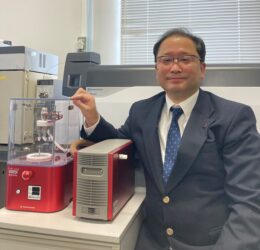Now we can concentrate aqueous samples, such as containing drugs, or their metabolites, or ingredients in health foods!
In this issue, we interviewed Professor Kiyoyuki Kitaichi from the Department of Biomedical Pharmaceutics at Gifu Pharmaceutical University in Japan.
Dr Kitaichi's laboratory(https://sites.google.com/gifu-pu.ac.jp/gpu-pk-official/) is well known for its collaborative research on illegal drugs, pharmaceuticals, and new health food ingredients.
Interviewee:
Professor Kiyoyuki Kitaichi , Gifu Pharmaceutical University

┃Dr. Kitaichi's research
1.
2.
3.
Development of a method for analysis of illegal drugs in biological samples and its application to understand the actual situation of illegal drug uses
Development of a rapid assay method for pharmaceuticals and research on the promotion of appropriate use of pharmaceuticals
Development of a method for analysis of new health food ingredients and its application to new food product development
┃Looking for better concentration methods
Traditionally our laboratory relied upon rotary evaporators and nitrogen blowing equipment to concentrate samples. To remove water from low volume aqueous samples was especially problematic as we had to add organic solvents several times to samples when drying using our nitrogen blowdown equipment. We were troubled by the fact that this methodology took a long time, up to 60 minutes, to remove water from these low volume aqueous samples. Using this method, our consumption of nitrogen gas was high, and there were some samples we did not want to add organic solvent to.
┃What prompted us to install Smart Evaporator
We saw Smart Evaporator at the exhibition of a conference of the Pharmaceutical Society of Japan. We were interested in it when we saw it once, and the second time, we heard an explanation of the equipment at the booth, and considered introducing it.
Since its introduction, we have been using Smart Evaporator mainly for the concentration of aqueous solvents. Specifically, we add organic solvents and other substances to the biological samples such as blood, tissue, or drug product samples, natural product extracts, and so on, and then we run the extraction process. After that, the samples in a rather higher aqueous ratio solvent, containing drugs and their metabolites or health food ingredients are concentrated using Smart Evaporator. Then, the concentrated liquid or the liquid that has been redissolved in mobile phase if necessary, is injected into HPLC, LC-MS, and other measurement instruments for analysis.
┃A new sample preparation methodology
We typically start our sample preparation methodology by adding organic solvents and other substances to biological samples such as blood, tissue, drug products, natural product extracts, and then run an extraction process.The resultant sample extracts in a rather higher aqueous ratio solvent, containing drugs, their metabolites or health food ingredients are then concentrated or completely dried using our Smart Evaporator C1 with a kit (4-kit).Then, the concentrated liquid or the resultant samples that has been redissolved in mobile phase if necessary, is injected into HPLC, LC-MS for analysis.
<Experimental conditions for concentration>
| Solvent name/solvent volume | : | Acetonitrile, purified water, ethanol, methanol, etc., about 0.5-2 mL. |
| Container type/volume | : | Eppendorf tubes (1.5, 2.0 mL) are often used. Test tubes (6 mL) are also used in rare cases. |
| Temperature setting | : | Variable depending on the solvent, from room temperature to about 50°C. |
| Concentration frequency | : | 12-20 samples (4 samples x 3-5 times) per time, when concentration is needed. |
| Working time | : | about 15 minutes per an operation |
*In some cases, taking advantage of the improved concentration efficiency of Smart Evaporator, the amount of liquid to be concentrated at one time can be increased, and the conventional work (for about 60 minutes) can be run for concentration.
┃What I felt after using the Smart Evaporator
<The impact of our Smart Evaporator>
It is now possible to concentrate aqueous samples quickly and easily, which was a problem with conventional nitrogen blowdown equipment. Our concentration process now takes just minutes rather than an hour and eliminates the need for wasteful use of nitrogen gas.The new Smart Evaporator concentration methodology is especially useful for compounds which have a high affinity for water.
<Challenges>
Since we are concerned about the damage to the pump caused by the vaporization of samples containing organic solvents, we feel it would be convenient if there were a small (inexpensive) trap for collecting organic solvents. Also our system (4kit in conjunction with Smart Evaporator C1) can only concentrate 4 samples, so it takes some time when there are several dozen samples. Ideally, we would like to be able to concentrate about 30 samples at a time.
Summary
Thank you to Professor Kitaichi for taking time out of his busy schedule for this User's Voice interview. Although the interview was conducted over the Internet, through his polite answers to our questions and his laboratory’s website I could tell that Dr. Kitaichi and his laboratory members are wonderful even without meeting him. His laboratory is actively involved in industry-government-academia collaborations, and is making a wide range of contributions to medical cares and society. I would be very honored if Smart Evaporator can be of any help to his research on the concentration of aqueous solvents. As a manufacturer, we sympathize with the vision that Dr. Kitaichi's laboratory is aiming for, and we will continue to support his research.
▼Dr. Kitaichi's laboratory website is here:
https://sites.google.com/gifu-pu.ac.jp/gpu-pk-official/
(in Japanese)
During the interview, he told us that metabolites are mostly water-soluble components. He suggested that many researchers are facing the problem that water is difficult to concentrate, which renewed our desire to create and provide better products. We will continue to do our best to meet your expectations, and we look forward to working with you.
(Interviewer: Arisa Tsubokawa)
■Interested in what Smart Evaporator is? You can learn from here!
